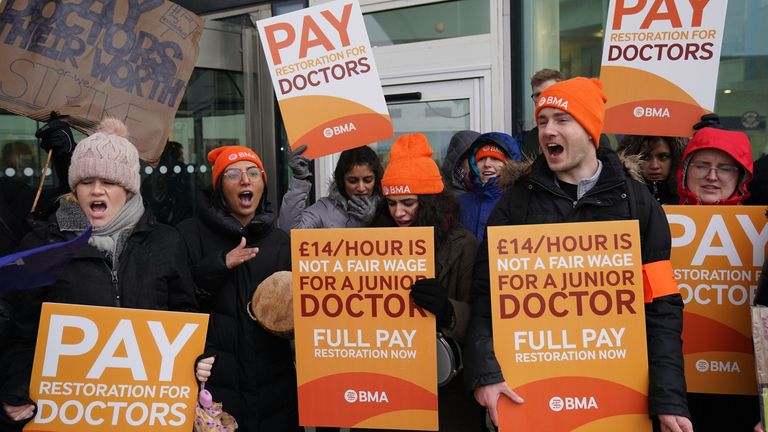Junior doctors' strike poses 'catastrophic risk' and impact 'could be felt for 11 days', health leaders fear
The NHS Confederation said patient care "rests on a knife edge" amid "huge uncertainty" over the level of cover trusts will be able to secure to fill key shifts during the four-day junior doctor strike next week.

Hospitals could struggle to provide even "basic" levels of safety when junior doctors strike next week - with the impact expected to be felt for 11 days, according to health leaders.
The NHS Confederation said patient care "rests on a knife edge" amid "huge uncertainty" over the level of cover trusts will be able to secure to fill key shifts.
While hospital leaders are working at "full pelt" to make sure emergency and other life-saving care can continue safely - even providing "basic safety" is a worry for some.
One hospital leader told the confederation that they are facing a "catastrophic risk" and that while it will officially last for four days, the strike's impact will be felt over 11 days due to reduced cover during the preceding Easter weekend and then during the weekend that will follow the end of the strike.
They said they have never worried more about the impact a strike could have on patients than this one.
Dr Layla McCay, director of policy at the NHS Confederation, said: "Health leaders are bracing themselves for the most significant strikes in a decade with many aspects of patient care resting on a knife edge.
"They want to send a reassuring message to their local communities but they are deeply concerned about not being able to provide safe care as they cannot rely on the same staffing levels as they have done with previous strikes."
The last junior doctors' strikes in March saw thousands of consultants provide cover, but health leaders do not expect a repeat performance as many consultants either have annual leave booked due to the holidays or are more reluctant to put themselves forward.
One hospital leader said that "where consultants covered last time, they have built time in lieu. Additionally, the next strike falls over Easter, when a lot of consultants had booked annual leave. This is all impacting on elective waiting lists".
Health leaders say they are having to plan for the worst to protect patient safety, including by cancelling more appointments and elective procedures than they would like to.
While last month's three-day walk-out saw more than 175,000 appointments and procedures having to be postponed, this month the figure could be as high as a quarter of a million.
One health leader said that "basic patient safety will be compromised" with emergency departments in particular likely to be "utterly overwhelmed".
"The NHS will be open for business but this will not mean business as usual," Dr McCay said.
The NHS Confederation urged the government and trade unions to "do everything they can" to call off the strikes and "to step up public communications urgently so that people who need healthcare understand what is available and at stake".
They are the latest body to sound the alarm, after NHS Providers also raised concerns over patient safety.
The four days of strikes will come immediately after the Easter bank holiday weekend, when there is typically higher demand.
Last Easter there were over 70,000 more calls to NHS 111 from Good Friday to Easter Sunday compared with the previous Friday to Sunday - a 37% increase.
Earlier, the British Medical Association (BMA) said only a "credible" pay offer aimed at resolving 15 years of wage erosion would be enough to stop the action.
The union, which has been asking for a 35% pay rise for junior doctors, did not indicate what this would look like.
Committee co-chairs of the BMA Dr Vivek Trivedi and Dr Robert Laurenson said: "There will be many details we can work out round the negotiating table but first of all we need to get into the room, with a credible offer on the table and that is where and when progress can be made."
They said the ball is "very much" in Health Secretary Steve Barclay's court.
However, the department of health called the BMA's pay demands "unreasonable" and urged the union to "come to the table with a realistic approach so we can find a way forward as we have done with other health unions".
The spokesperson added: "We are working with NHS England to put in place contingency plans to protect patient safety. The NHS will prioritise resources to protect emergency treatment, critical care, neonatal care and trauma."
-sky news







